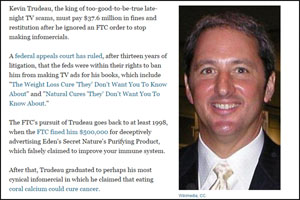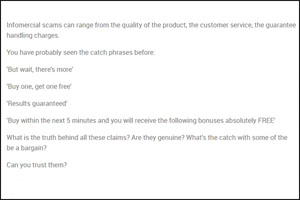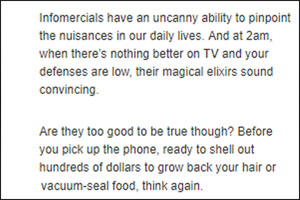Infomercial Scams
Infomercial Scams:
Lose pounds! Gain hair! Look younger! Get healthier!
With an arsenal of candid quality and colorful demonstrations, these long commercials—what we label as infomercials—have a weird ability to pin down the concerns of our daily lives. Carefully scripted to exhilarate dopamine levels in your brain, infomercials take viewers on a psychological roller-coaster ride to take your very last dollar.
When there is nothing better on television, watching an infomercial may seem fine—but don't get convinced by their magical elixirs. Whether you're watching an infomercial just because you're too lazy to grab the remote or actually planning to buy something, chances are you might get scammed.
 '
'
The Most Famous Infomercial Taglines of All Time
"But wait... there's more!"
"Money-back guaranteed!"
"Not available in stores"
"We'll double the offer"
Don't be misled or conned by infomercial scams that are not to be trusted. Are they too good to be true? Think twice—even before you pick up the phone to place an order. The clairvoyant crooks try to deceive you by closing the deal with a "1 + 1" offer or an "If you buy now" deal, throwing in a complimentary gift as part of a "fitness deal" or "baldness deal"—offers that benefit them and only them. Before you shell out hundreds of dollars for that so-called instant result, think again. Among various schemes, the shipping & handling scam remains one of the most common in the infomercial industry.
Infomercial scams aren’t limited to products. You’ll also come across property-related deals like "Real Estate Riches in 14 Days", "Shortcuts to Internet Millions", and many more. Stay away from infomercials promoting get-rich-quick systems. Nearly 1 million consumers were scammed out of $478 million by phony claims that promised easy money. Remember: “Nothing great ever came that easy.” And if it does, make sure you know every single detail behind it. Among the biggest real estate infomercial scams, John Beck’s case tops the list—he was sued by the FTC. After purchasing these advertised systems, many consumers are unknowingly enrolled in continuity programs that charge recurring fees. These deceptive acts should be reported.
Infomercial scams exploit individuals through deceptive television programming, making exaggerated claims about products or services to encourage purchases. These scams often involve products that promise exceptional results, quick fixes, or miraculous benefits. Viewers are subjected to high-pressure sales tactics that create a sense of urgency and prompt impulsive buying. These infomercials may feature fake testimonials, and often come with hidden costs or fees. To protect yourself from infomercial scams, conduct thorough research, verify claims through credible sources, review terms and conditions for hidden charges, avoid impulsive decisions, and report fraud to consumer protection agencies. By staying vigilant and informed, consumers can reduce the risk of falling victim to deceptive infomercial practices.

How it works?
There are some key elements designed to appeal to the emotional responses of viewers, which include:
-
Sense of urgency
-
The offer
-
Problem/Solution
-
Lofty promises
-
Instant results
-
Testimonials
By portraying dramatic real-life examples, infomercials repeat their sales pitches in various forms throughout the program, targeting consumers who likely desire those instant results for themselves. Sense of urgency is a key element here, and chances are, you may fall for those glowing testimonials.
Infomercial scams operate by utilizing deceptive marketing techniques in televised programs. These scams feature products or services with exaggerated or false claims, promising quick and remarkable results. High-pressure sales tactics—such as limited-time offers and exclusive deals—create a sense of urgency that encourages impulsive purchases. Hidden costs or fees, not transparently disclosed during the infomercial, may surprise buyers. False testimonials are often used to build credibility and trust, showcasing individuals who claim extraordinary benefits that may not be authentic. Viewers are enticed with emotional appeals and promises of immediate success.
To protect against infomercial scams, individuals should conduct thorough research on products, verify claims, understand terms and conditions, avoid impulsive decisions, and report fraudulent activities to consumer protection agencies. By staying vigilant and informed, consumers can make more prudent purchasing choices and avoid falling victim to deceptive infomercial practices.
How to find if an infomercial is a scam?
Slow down your spellbinders and lower the chances of being scammed by being aware of the red flags. Upselling, electronic funds transfer only, “one product does it all”, and “scientific breakthrough” are some of the alerts to watch out for! If you've been scammed by an infomercial, write a complaint to infomercialscams.org and the Better Business Bureau (BBB), and also report it to your local authorities.
To identify if an infomercial is a potential scam, follow these steps:
First, research the product independently, seeking reviews from reputable sources. Be skeptical of exaggerated claims or promises of miraculous results without scientific backing. Verify the authenticity of testimonials, as fabricated endorsements are common in scams. Carefully read the terms and conditions to spot hidden fees or recurring charges. Check for clear contact information and a legitimate company address. Search online for complaints or scam reports related to the product or company. Evaluate whether the claims are supported by scientific evidence or reputable endorsements. Be cautious of high-pressure sales tactics, such as limited-time offers. Trust your instincts—if something seems too good to be true, it likely is. These precautions help consumers make informed decisions and avoid falling victim to deceptive infomercial practices.
.







